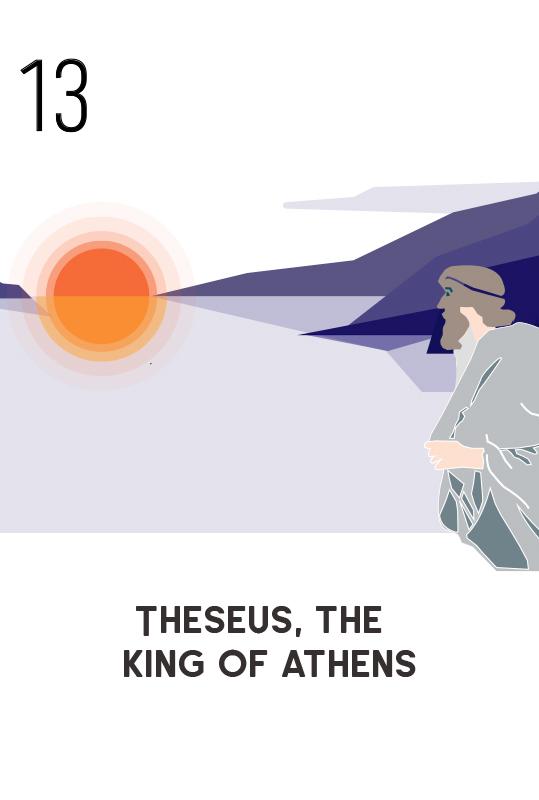
Theseus, the king of Athens
Theseus, the king of Athens
The semi -mythical, semi -historical Theseus was the great hero of ancient Athens. The numerous heroic deeds ascribed to him were seen by the ancient Athenians as the acts that led to the birth of democracy in the Attic city -state, the cradle of Greek democracy.
Since he is portrayed as the contemporary of Hercules, it can be assumed that he belonged to the generation previous to the Trojan War. His grand exploits against vicious villains and dreadful monsters are said to be an allegorical representation of how Theseus got rid of the tyrants, got the Athenians free from fear, and brought an end to the burdensome tribute the city had to pay to foreign powers.
Discover the myth of Theseus, the legendary king. Having two fathers, Aegeus, one of the prehistoric kings of Athens, although twice married, had no hair to the throne. So, he made the pilgrimage to consult the celebrated oracle of Delphi.
As he didn't get a clear -cut answer from the oracle, he sought advice from his wife's friend Pythias, king of Trizina in Argolis. Pythias happily gave away his daughter Aetra to his friend at a secret wedding.
Aetra, after having lain with her husband on her wedding night, decided to take a walk in the moonlight, which took her through the shallow waters of the sea to the Sferia island on the opposite coast of Poros.
There she found Poseidon, god of the sea and earthquakes. Aetra, in the middle of the night and under the moonlight, was seduced by Poseidon. Thus, she got doubly impregnated with the seed of a mortal and a god, giving birth to our hero Theseus, blessed to be born with both human and divine qualities.
Set sail to kill the Minotaur.
Theseus learned that Athens was facing a great tragedy. For the past couple of decades, Aegeus had been paying a barbarous tribute to King Minas of Crete after he had been defeated in a long -running war, launched by the Cretans to avenge the murder of Androgens, the younger son of the Cretan king by the Athenians.
The tribute consisted of seven boys and seven maidens from the noblest families of Athens to be sent at every nine years to Crete to be devoured by the Minotaur, the fearful half -man, half -beast who lived in the labyrinth, an impressive construction with crossed paths through which no man could escape.
Despite his father's objections, Theseus was determined to embark upon the perilous mission as one of nine boys on the occasion of the third tribute. Before he set sail, he promised his father Aegeus that should he return victorious from this task, the ship carrying him and the others would hoist white sails instead of the normal black sails.
Theseus set sail with his fellow boys and maidens only after taking some wise precautions. He consulted an oracle which told him to make Aphrodite the goddess of love and beauty his patroness. After making the necessary sacrifices to the goddess, he embarked on his fateful journey to confront the dreadful Minotaur.
Theseus... and his fellow sacrificial lambs were given an audience by King Minos at the palace where Ariadne, daughter of the Cretan king, fell madly in love with our hero, instigated by Aphrodite. Ariadne somehow managed to meet the noble youth alone, while they swore eternal love and fidelity to each other.
She also provided him with a sharp sword to slay the Minotaur and a skein of thread to find his way back within the complex maze. Thus armed, Theseus and his company entered the inscrutable labyrinth.
Following the advice of Ariadne, Theseus fastened the end of the thread and the entrance to the labyrinth and continued to carefully unwind the skein as he was looking for the great beast. After a while, the brave youth finally found Minotaur in his lair.
There ensued a long and fierce battle which came to an end when Theseus killed the monster with the sword Ariadne had given him. Following the line of the thread, Theseus and his companions safely came out of the labyrinth where an anxious Ariadne was waiting for him.
Then the two quickly embarked on the ship to Athens before King Minos learned that Minotaur was killed and his own daughter had helped Theseus. However, the happiness of the young lovers was to live short.
At the island of Naxos, where the ship had touched, Theseus had a dream in which the white god Dionysus told him that Ariadne had been reserved by the fates to be his bride and also warned him of innumerable misfortunes if he didn't give up the maiden.
Although he had no fear of any master of villain, Theseus had great respect for the gods and wanted to have their favor. So, Theseus and Ariadne took a tearful farewell of each other and the ship set sail to Athens.
Unfortunately, everyone in the ship was distraught at parting from Ariadne and forgot to change the ship's sails to white. Another, more credible version of the story says that Theseus pretended to be in love with Ariadne in order to obtain her help.
After they left Crete safely, our hero abandoned the lovely maiden at Naxos, as she had no more use for her. The heartbroken Ariadne cursed Theseus and his companions, and they all forgot to change the ship's sail from black to white.
In any case, after Ariadne was abandoned to Naxos, God Dionysus made her his bride. and they lived together and three sons, Thoas, Oenopion, and Staphylus. Later on Dionysus brought Ariadne to Mount Olympus to live with the other gods.
In the meanwhile, Aegeus was waiting in anxiety for his son to come back from Crete. Every evening he was going to Cape Sounion, the southernmost area of Athens, to see the ship coming from Crete. However, months had passed and his son had not returned.
One day, as he was standing on a cliff at Sounion, he finally saw the ship, but the sails were black. He immediately thought that his son was dead, and in total despair, he fell into the sea and got drowned.
From then on, the Athenians named the sea the Aegean Sea, in memory of their beloved King.





